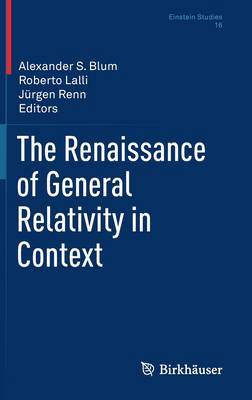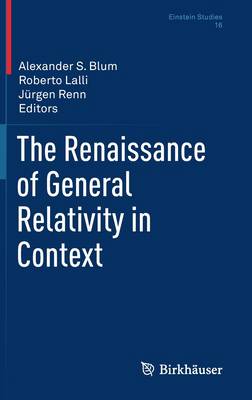
- Afhalen na 1 uur in een winkel met voorraad
- Gratis thuislevering in België vanaf € 30
- Ruim aanbod met 7 miljoen producten
- Afhalen na 1 uur in een winkel met voorraad
- Gratis thuislevering in België vanaf € 30
- Ruim aanbod met 7 miljoen producten
Zoeken
The Renaissance of General Relativity in Context
€ 137,45
+ 274 punten
Omschrijving
This contributed volume explores the renaissance of general relativity after World War II, when it transformed from a marginal theory into a cornerstone of modern physics. Chapters explore key historical processes related to the theory of general relativity, in addition to presenting a thorough treatment of the relevant science behind these episodes. A broad historiographical framework is introduced first, thus providing the broad context in which the given computational approaches and case studies occurred. Written by an international and interdisciplinary group of expert authors, these chapters will bring readers to a more complete understanding of Einstein's theory. Specific topics include:
- Social and citation networks
- The Fock-Infeld dispute
- Wheeler's turn to gravitation theory
- The position of general relativity in theories of fundamental interactions
- The pursuit of a quantum theory of gravity
- The emergence of dark matter in relation to cosmological models
- Institutional frameworks for gravitational wave search in Europe
Specificaties
Betrokkenen
- Uitgeverij:
Inhoud
- Aantal bladzijden:
- 406
- Taal:
- Engels
- Reeks:
- Reeksnummer:
- nr. 16
Eigenschappen
- Productcode (EAN):
- 9783030507534
- Verschijningsdatum:
- 13/11/2020
- Uitvoering:
- Hardcover
- Formaat:
- Genaaid
- Afmetingen:
- 156 mm x 234 mm
- Gewicht:
- 757 g

Alleen bij Standaard Boekhandel
+ 274 punten op je klantenkaart van Standaard Boekhandel
Beoordelingen
We publiceren alleen reviews die voldoen aan de voorwaarden voor reviews. Bekijk onze voorwaarden voor reviews.










